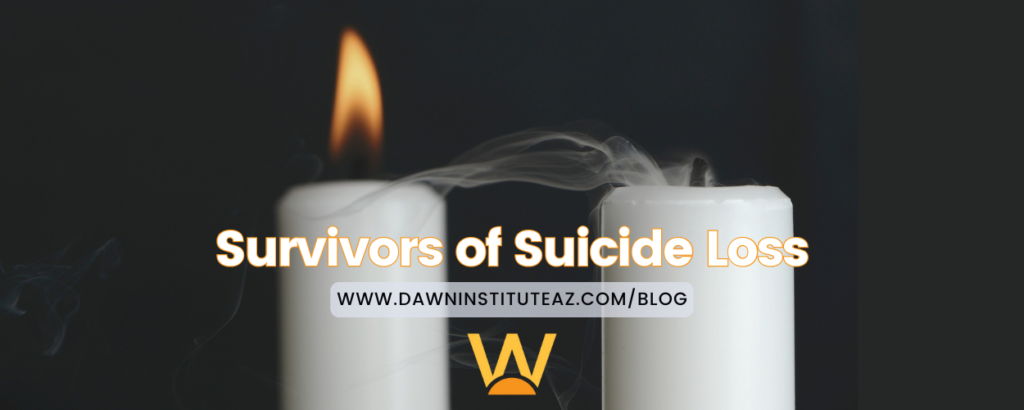November 19th was International Survivors of Suicide Loss Day this year. Being a loved one for someone who has completed suicide is unimaginably hard. It is such a complex grief. So how do we move on with our lives so we don’t stay stuck? How do we continue to hold love for our child, parent, relative, or friend while still loving ourselves when they are gone?
I have heard many people blame themselves. They blame themselves for not seeing the signs or knowing what that person was feeling or thinking. They blame themselves for not being a good support. I’ve even heard some blame themselves for not being enough. It’s easy to get in this defeating cycle of blame which makes it so hard just to get through everyday life.
First and foremost, suicide is generally something that is going on inside of the person — inside their thoughts and feelings. Yes, there is a lot we can do as supports, but ultimately it is not our fault. A lot of times we don’t know the signs until it is too late. A lot of times we don’t know the resources or avenues to take for help. So how can we blame ourselves for something we did not know?
I’ve had client’s respond with, “Well, we should have known.” We, people, are not mind readers. We can only know as much as someone will let us know.
I’ve heard people say they had a suspicion, but they ignored it. In all honesty, when have any of us followed every suspicion we’ve had? How many times have you ignored a “gut” feeling? We are taught to do that every day.
So how can we get through all these overwhelming cycling thoughts as survivors of suicide loss?
Validate
First, take some breaths and validate yourself. Tell yourself it’s ok that you’re still struggling. Tell yourself it’s ok that you’re still hurting. Remember what brings you joy. Do something for you, something that you love. Your loved one would not want your life to
stop.
Go outside for a walk. Draw, color, or paint. Go swimming or go on a hike. Listen to music and sing. Take some time to yourself to read, or maybe sit outside. What is something that you enjoy that soothes you? Find what that is and start doing it again.
Honor Your Loved One
It can be a really good feeling to do something for your loved one. I’ve known some people who light candles, have a photo where each time they pass it, they say a prayer. I’ve had some people bake or buy a cake for their loved one every year for their birthday. Take time to blow out candles on the cake and recall your favorite memories of your loved one. Think of something that is a positive way to remember them and celebrate their life. Celebrate the positive memories you shared. Having a way to honor your loved one at special times of the year can help you remember the happy moments of your loved one.
Supports
Use your supports. Talk to family, friends, or anyone who you find comfort in. Don’t minimize your pain because you think someone else doesn’t need to worry about what you’re going through, or that they have enough to deal with. Trusted people are there for a reason. They are there so we can lean on each other when we need support. If you don’t feel safe talking to a loved one, find a support group or find another way to gain support. And, as always, Dawn Institute is here for further help if you need it. Reach out today if you are interested or having questions.
Additional Resources:
After A Suicide Resource Directory: Coping with Grief, Trauma, and Distress
Friends for Survival
Parents of Suicides and Friends & Families of Suicides

